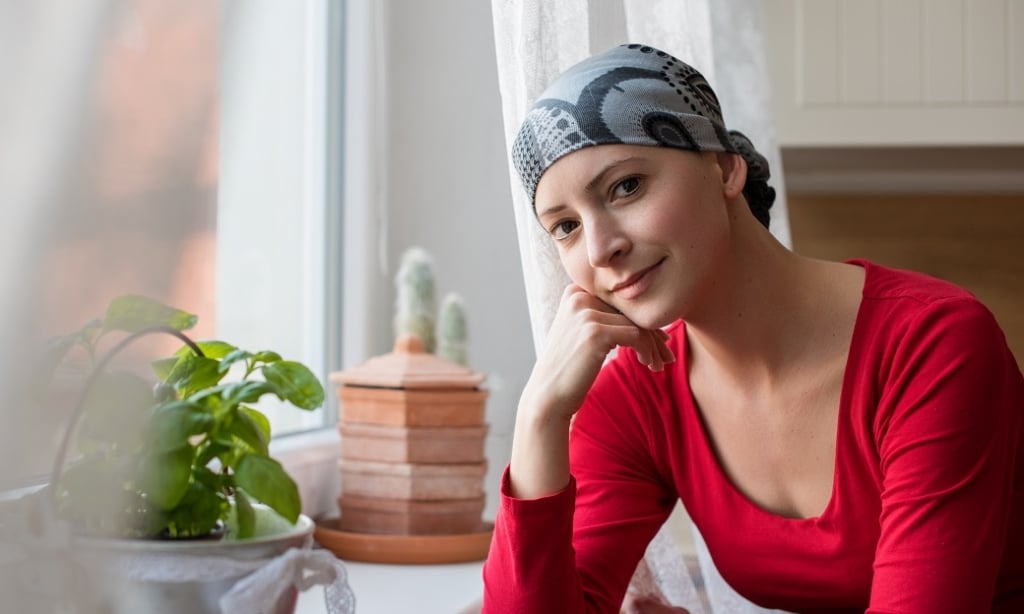Tamoxifen is a medication used to reduce the risk of breast cancer recurrence. Although it’s an important treatment, it may cause side effects such as hot flashes, weight gain, mood changes, joint pain, and muscle pain. Using integrative approaches may be helpful in managing some side effects from tamoxifen.
How do I manage tamoxifen side effects?
Hot flashes
- Exercise and mental well-being: Exercise, yoga, and practicing relaxation (such as slow deep breathing, or listening to an audio meditation) may lower the number and strength of hot flashes.1Stagl JM, Lechner SC et al. A randomized controlled trial of cognitive‑behavioral stress management in breast cancer: survival and recurrence at 11‑year follow‑up. Breast Cancer Research and Treatment. 2015;154(2):319‑328; Kaplan M, Mahon SM, Lubejko BG, Ginex PK. Hot flashes: clinical summary of the ONS Guidelines™ for cancer treatment–related hot flashes in women with breast cancer and men with prostate cancer. Clinical Journal of Oncology Nursing. 2020;24(4):430–433; Runowicz CD, Leach CR et al. American Cancer Society/American Society of Clinical Oncology Breast Cancer Survivorship Care Guideline. Journal of Clinical Oncology. 2016;34(6):611–635; Rada G, Capurro D et al. Non‑hormonal interventions for hot flushes in women with a history of breast cancer. Cochrane Database of Systematic Reviews. 2010;(9):CD004923; Carson JW, Carson KM, Porter LS, Keefe FJ, Seewaldt VL. Yoga of Awareness program for menopausal symptoms in breast cancer survivors: results from a randomized trial. Supportive Care in Cancer. 2009;17(10):1301–1309.
- Working with a counselor to manage stress through thinking and behavior, also called “cognitive behavioral therapy,” may help lower hot flashes.2Mann E, Smith MJ et al. Cognitive behavioural treatment for women who have menopausal symptoms after breast cancer treatment (MENOS 1): a randomised controlled trial. Lancet Oncology. 2012 Mar;13(3):309-18.
- Diet: Avoiding spicy foods, caffeine, and alcohol may reduce hot flashes.3Runowicz CD, Leach CR et al. American Cancer Society/American Society of Clinical Oncology Breast Cancer Survivorship Care Guideline. Journal of Clinical Oncology. 2016;34(6):611–635.
- Acupuncture4Greenlee H, DuPont-Reyes MJ et al. Clinical practice guidelines on the evidence-based use of integrative therapies during and after breast cancer treatment. CA: A Cancer Journal for Clinicians. 2017 May 6;67(3):194-232; Chan T, Wang N et al. Systematic review with meta-analysis: effectiveness and safety of acupuncture as adjuvant therapy for side effects management in drug therapy-receiving breast cancer patients. Evidence-based Complementary and Alternative Medicine. 2021 Oct 12:2021:9949777. and Traditional Chinese Medicine5Xue D, Sun H, Li PP. Long-term Chinese herbs decoction administration for management of hot flashes associated with endocrine therapy in breast cancer patients. Chinese Journal of Cancer Research. 2011;23(1):74–78. may reduce hot flashes.
- Black cohosh may or may not help reduce hot flashes.6Hernández MG, Pluchino S. Cimicifuga racemosa for the treatment of hot flushes in women surviving breast cancer. Maturitas. 2003;44 Suppl 1:S59-S65; Wang C, Huang Q et al. Effect of cimicifuga racemosa on menopausal syndrome caused by LHRH-a in breast cancer. Journal of Ethnopharmacology. 2019;238:111840; Jacobson JS, Troxel AB et al. Randomized trial of black cohosh for the treatment of hot flashes among women with a history of breast cancer. Journal of Clinical Oncology. 2001;19(10):2739–2745. Black cohosh does not increase estrogen, is probably safe for use with tamoxifen,7Fritz H, Seely D et al. Black cohosh and breast cancer: a systematic review. Integrative Cancer Therapies. 2014;13(1):12-29. and may improve sexual function.8Wang Z, Sun Y et al. Effect of Cimicifuga racemosa on menopausal syndrome caused by LHRH‑a in breast cancer patients: a randomized trial. Journal of Ethnopharmacology. 2019;238:111840.
Fatigue
- Exercise: Exercise, including aerobic (“cardio”), lifting weights, yoga, tai chi, and qigong, are all helpful for lowering fatigue.9Ee C, Kay S et al. Lifestyle and integrative oncology interventions for cancer-related fatigue and sleep disturbances. Maturitas. 2024;187:108056; Li Y, Gao L et al. Various interventions for cancer-related fatigue in patients with breast cancer: a systematic review and network meta-analysis. Frontiers in Oncology. 2024;14:1341927. The intensity of the exercise can be low to moderate. 10Bower JE, Lacchetti C et al. Management of fatigue in adult survivors of cancer: ASCO-Society for Integrative Oncology Guideline update. Journal of Clinical Oncology. 2024;42(20):2456-2487.
- Mental well-being: Working with a counselor and taking some time in peace to focus on your experience, whether it’s thoughts, prayer, or checking in on how your body feels, are also good ways to help manage fatigue.11Bower JE, Lacchetti C et al. Management of fatigue in adult survivors of cancer: ASCO-Society for Integrative Oncology Guideline update. Journal of Clinical Oncology. 2024;42(20):2456-2487.
- Managing other health problems: Managing and resolving issues like pain, depression, trouble sleeping, and poor nutrition may help fatigue.12Bower JE, Lacchetti C et al. Management of fatigue in adult survivors of cancer: ASCO-Society for Integrative Oncology Guideline update. Journal of Clinical Oncology. 2024;42(20):2456-2487.
- Reishi mushroom (Ganoderma lucidum) may increase energy and mood in breast cancer survivors.13Zhao H, Zhang Q et al. Spore powder of Ganoderma lucidum improves cancer‑related fatigue in breast cancer patients undergoing endocrine therapy: a pilot clinical trial. Evidence-based Complementary and Alternative Medicine. 2012;2012:809614.
Quality of life
- Mindfulness and relaxation: Relaxation exercises and mindfulness-based practices can help people sleep better and improve their quality of life.14Ee C, Kay S et al. Lifestyle and integrative oncology interventions for cancer-related fatigue and sleep disturbances. Maturitas. 2024;187:108056; Li Y, Gao L et al. Various interventions for cancer-related fatigue in patients with breast cancer: a systematic review and network meta-analysis. Frontiers in Oncology. 2024;14:1341927. Exercise, yoga, and relaxation techniques (e.g. paced respirations, mindfulness-based stress reduction) may improve joint pain and sleep quality.15Stagl JM, Lechner SC et al. A randomized controlled trial of cognitive‑behavioral stress management in breast cancer: survival and recurrence at 11‑year follow‑up. Breast Cancer Research and Treatment. 2015;154(2):319‑328.
Natural support options
- Melatonin may improve sleep16Seo K, Kim JH, Han D. Effects of melatonin supplementation on sleep quality in breast cancer patients: a systematic review and meta-analysis. Healthcare (Basel). 2023 Feb 24;11(5):675. and reduce depression in breast cancer survivors.17Hansen MV, Andersen LT et al. Effect of melatonin on depressive symptoms and anxiety in patients undergoing breast cancer surgery: a randomized, double‑blind, placebo‑controlled trial. Breast Cancer Research and Treatment. 2014;145(3):683–695. In people with advanced breast cancer, melatonin may help tamoxifen work better18Lissoni P, Barni S et al. Modulation of cancer endocrine therapy by melatonin: a phase II study of tamoxifen plus melatonin in metastatic breast cancer patients progressing under tamoxifen alone. British Journal of Cancer. 1995;71(4):854–856. and improve quality of life.19Innominato PF, Lim AS et al. Effect of melatonin on sleep and quality of life in patients with advanced breast cancer. Supportive Care in Cancer. 2016;24(3):1097–1105.
- CoQ10 helps lower blood fats (lipids), reduce inflammation, and lower tumor markers in people using tamoxifen.20Zahrooni N, Hosseini SA et al. The effect of coenzyme Q10 supplementation on vascular endothelial growth factor and serum levels of interleukin‑6 and ‑8 in women with breast cancer: a double‑blind, placebo‑controlled, randomized clinical trial. Therapeutics and Clinical Risk Management. 2019;15:1403–1410; Yuvaraj S, Premkumar VG, Vijayasarathy K, Gangadaran SG, Sachdanandam P. Augmented antioxidant status in Tamoxifen treated postmenopausal women with breast cancer on co-administration with Coenzyme Q10, Niacin and Riboflavin. Cancer Chemotherapy and Pharmacology. 2008;61(6):933-941; Yuvaraj S, Premkumar VG, Shanthi P, Vijayasarathy K, Gangadaran SG, Sachdanandam P. Effect of Coenzyme Q(10), Riboflavin and Niacin on Tamoxifen treated postmenopausal breast cancer women with special reference to blood chemistry profiles. Breast Cancer Research and Treatment. 2009;114(2):377-384; Premkumar VG, Yuvaraj S, Shanthi P, Sachdanandam P. Co-enzyme Q10, riboflavin and niacin supplementation on alteration of DNA repair enzyme and DNA methylation in breast cancer patients undergoing tamoxifen therapy. British Journal of Nutrition. 2008;100(6):1179-1182; Yuvaraj S, Premkumar VG, Vijayasarathy K, Gangadaran SG, Sachdanandam P. Ameliorating effect of coenzyme Q10, riboflavin and niacin in tamoxifen-treated postmenopausal breast cancer patients with special reference to lipids and lipoproteins. Clinical Biochemistry. 2007;40(9-10):623-628. CoQ10 may also improve physical health and cognitive function.21Hosseini SA, Zahrooni N, Ahmadzadeh A, Ahmadiangali K, Assarehzadegan MA. The effect of CoQ10 supplementation on quality of life in women with breast cancer undergoing Tamoxifen therapy: a double-blind, placebo-controlled, randomized clinical trial. Psychology Research and Behavior Management. 2020;13:151-159.
- Vitamin C can lower inflammation and oxidative stress in people taking tamoxifen.22Muralikrishnan G, Amanullah S, Basha MI, Boopalan S, Vijayakumar S, Shakeel F. Effect of vitamin C on lipid peroxidation and antioxidant status in tamoxifen‑treated breast cancer patients. Chemotherapy. 2010;56(4):298–302.
- Reishi mushroom may help boost the immune system, improve sleep, and support brain health in women on tamoxifen or other estrogen-blocking medications.23Su YW, Huang WY, Lin SH, Yang PS. Effects of Reishimmune‑S, a fungal immunomodulatory peptide supplement, on the quality of life and circulating natural killer cell profiles of patients with early breast cancer receiving adjuvant endocrine therapy. Integrative Cancer Therapies. 2024;23:15347354241242120.
- Fish oil (omega-3 oils) may improve depression, mood, and sleep in women taking hormone-blocking medications.24Nourozi B, Naghsh E et al. Omega-3 in the subjective betterment of mood and sleep disturbances induced by hormone therapy in women with breast cancer: a pilot, randomized, double-blinded, placebo-controlled clinical trial. Sleep and Vigilance. 8, 39–47 (2024).
- Vitamin D3 deficiency is common in breast cancer survivors and this deficiency may reduce quality of life.25Cross T, George A, Attwood K, et al. Associations between serum 25-hydroxyvitamin D levels and health-related quality-of-life measures in patients with breast cancer: a longitudinal study. Cancer Epidemiology, Biomarkers, and Prevention. 2022;31(12):2126-2135; Andersen MR, Sweet E, Hager S, Gaul M, Dowd F, Standish LJ. Effects of vitamin D use on health-related quality of life of breast cancer patients in early survivorship. Integrative Cancer Therapies. 2019;18:1534735418822056. Taking a vitamin D supplement is recommended to treat deficiency and support bone health.26Shapiro CL, Van Poznak C et al. Management of osteoporosis in survivors of adult cancers with nonmetastatic disease: ASCO Clinical Practice Guideline. Journal of Clinical Oncology. 2019;37(31):2916-2946.
Nutrition
Eating a diet high in vegetables, fruits, whole grains, legumes, and olive oil and limiting alcohol is recommended for breast cancer survivors.27Runowicz CD, Leach CR et al. American Cancer Society/American Society of Clinical Oncology Breast Cancer Survivorship Care Guideline. Journal of Clinical Oncology. 2016;34(6):611–635. This way of eating is in line with a Mediterranean-style diet, which has been associated with a lower risk of breast cancer recurrence.28Berrino F, Villarini A et al. The effect of diet on breast cancer recurrence: the DIANA‑5 randomized trial. Clinical Cancer Research. 2024 Mar 1;30(5):965-974.
- In the DIANA-5 clinical trial, breast cancer survivors who closely followed a Mediterranean diet had a 41% reduction in cancer recurrence compared to those who were not compliant with the diet.29Berrino F, Villarini A et al. The effect of diet on breast cancer recurrence: the DIANA‑5 randomized trial. Clinical Cancer Research. 2024 Mar 1;30(5):965-974.
Specific foods and nutrients
- Soy: Soy foods are safe for breast cancer survivors taking tamoxifen.30Chi F, Wu R, et al. Post‑diagnosis soy food intake and breast cancer survival: a meta‑analysis of cohort studies. Asian Pacific Journal of Cancer Prevention. 2013;14(4):2407–2412; Caan BJ, Natarajan L et al. Soy food consumption and breast cancer prognosis. Cancer Epidemiology, Biomarkers, and Prevention. 2011;20(5):854–858. Some studies show soy may improve survival31 Zhang FF, Haslam DE et al. Dietary isoflavone intake and all‑cause mortality in breast cancer survivors: the Breast Cancer Family Registry. Cancer. 2017;123(11):2070–2079; Qiu S, Jiang C. Soy and isoflavones consumption and breast cancer survival and recurrence: a systematic review and meta-analysis. European Journal of Nutrition. 2019 Dec;58(8):3079-3090. or reduce recurrence,32Nechuta SJ, Caan BJ et al. Soy food intake after diagnosis of breast cancer and survival: an in-depth analysis of combined evidence from cohort studies of US and Chinese women. American Journal of Clinical Nutrition. 2012 Jul;96(1):123-32. while others found no harm or benefit.33Qiu S, Jiang C. Soy and isoflavones consumption and breast cancer survival and recurrence: a systematic review and meta-analysis. European Journal of Nutrition. 2019 Dec;58(8):3079-3090. Soy may also help with heart health and stroke prevention.34Yan Z, Zhang X, Li C, Jiao S, Dong W. Association between consumption of soy and risk of cardiovascular disease: a meta-analysis of observational studies. European Journal of Preventive Cardiology. 2017 May;24(7):735-747. Choose whole soy foods like soy milk, tofu, edamame, tempeh, and miso.
- Ground flax: Ground flax is a safe, high-fiber food that can be eaten every day. It doesn’t interfere with tamoxifen and may help it to work better. In general, avoid taking high-fiber foods like flax at the same time as medications.35Flower G, Fritz H et al. Flax and breast cancer: a systematic review. Integrative Cancer Therapies. 2014 May;13(3):181-92.
- Green tea: Drinking green tea may help prevent breast cancer from returning and is safe to use with tamoxifen.36Yiannakopoulou EC. Interaction of green tea catechins with breast cancer endocrine treatment: a systematic review. Pharmacology. 2014;94(5-6):245-8; Gianfredi V, Nucci D et al. Green tea consumption and risk of breast cancer and recurrence-a systematic review and meta-analysis of observational studies. Nutrients. 2018 Dec 3;10(12):1886.
- Vitamin C: Getting vitamin C from food or supplements is linked to a lower risk of death for breast cancer survivors.37Harris HR, Orsini N, Wolk A. Vitamin C and survival among women with breast cancer: a meta-analysis. European Journal of Cancer. 2014 May;50(7):1223-31; Kanellopoulou A, Riza E, Samoli E, Benetou V. Dietary supplement use after cancer diagnosis in relation to total mortality, cancer mortality and recurrence: a systematic review and meta-analysis. Nutrition and Cancer. 2021;73(1):16-30.
Precautions
Some natural products could impact the effectiveness of tamoxifen (e.g. diindolylmethane (DIM) and curcumin). Until more is known, it may be best not to use these as supplements or to discuss with your healthcare provider.38Stopeck A, Maskarinec G et al. A randomized, placebo-controlled trial of diindolylmethane for breast cancer biomarker modulation in patients taking tamoxifen. Breast Cancer Research and Treatment. 2017 Aug;165(1):97-107; Hussaarts KGAM, Hurkmans DP et al. Impact of curcumin (with or without piperine) on the pharmacokinetics of tamoxifen. Cancers (Basel). 2019 Mar 22;11(3):403.
7 Lifestyle Practice tips
The 7 Lifestyle Practices can make you healthier in many ways
- If you smoke, consider seeking support to help you quit.
- Move toward a healthy body weight and exercise daily.39Meneses-Echávez JF, González-Jiménez E, Ramírez-Vélez R. Effects of supervised exercise on cancer-related fatigue in breast cancer survivors: a systematic review and meta-analysis. BMC Cancer. 2015 Feb 21;15:77.
- Reduce stress and anxiety and improve your quality of life with relaxation, meditation, and yoga.40Carson JW, Carson KM, Porter LS, Keefe FJ, Seewaldt VL. Yoga of Awareness program for menopausal symptoms in breast cancer survivors: results from a randomized trial. Supportive Care in Cancer. 2009;17(10):1301–1309.
- Aim for a Mediterranean diet including more olive oil, vegetables, and fruit every day.41Berrino F, Villarini A, Gargano G, et al. The effect of diet on breast cancer recurrence: the DIANA‑5 randomized trial. Clinical Cancer Research. 2024 Mar 1;30(5):965-974.
- Surround yourself with a supportive health care team! Ask your oncology center about integrative medicine services such as massage, acupuncture, naturopathic medicine, counseling, nutrition, Reiki, laughter therapy, music therapy, yoga, and other supportive care.
Read more about breast cancer
This article was produced through a collaboration of KNOWintegrativeoncology.org, CancerChoices, and the Patterson Institute for Integrative Oncology Research.
Download our printable brochure on Managing Tamoxifen Side Effects ›
Authors: Heather Wright, ND; Sarah Soles, ND; Casey Martell, ND, MBA; Julie Robinson, ND; Gwen Stritter, MD; Pallav Mehta, MD; Dugald Seely, ND, MSc; Ellen Conte, ND; Jen Green, ND
References





